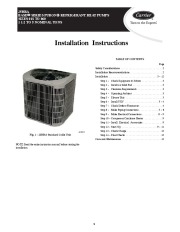| Categories | Carrier HVAC Manuals |
|---|---|
| Document Type | Heating, Ventilating and Air Conditioning Manual Free Download. HAVC Operator's Instruction Manual. |
| Tags | Carrier 25HBA |
| Download File |
|
| Language | English |
| Product Brand | Carrier. Support Phone Number: In North America, please call 1-800-CARRIER for immediate customer assistance from 8:00a -5:00p (EST) weekdays , Heating, Ventilating and Air Conditioning - HVAC |
| Document File Type | |
| Publisher | corp.carrier.com |
| Wikipedia's Page | Carrier Corporation |
| Copyright | Attribution Non-commercial |
25HBA BASET SERIES PURONR REFRIGERANT HEAT PUMPS SIZES 018 TO 060 1 1/2 TO 5 NOMINAL TONS Installation Instructions TABLE OF CONTENTS Page Safety Considerations . 2 Installation Recommendations 2 Installation 3 – 12 Step 1 – Check Equipment & Jobsite . 3 Step 2 – Install on Solid Pad 3 Step 3 – Clearance Requirements 3 Step 4 – Operating Ambient 3 Step 5 – Elevate Unit . 3 Step 6 – Install TXV . 3 – 4 Step 7 – Check Defrost Thermostat .
4 Step 8 – Make Piping Connections 5 – 8 Step 9 – Make Electrical Connections 8 – 9 Step 10 – Compressor Crankcase Heater . 9 Step 11 – Install Electrical Accessories 9 Step 12 – Start-Up 9 – 11 A05341 Step 13 – Check Charge . 12 Step 14 – Final Checks 12 Care and Maintenance . 12 Fig. 1 – 25HBA Standard Grille Unit NOTE:Read the entire instruction manual before starting the installation. 1 SAFETY CONSIDERATIONS Improper installation, adjustment, alteration, service, maintenance, or use can cause explosion, fire, electrical shock, or other conditions which may cause death, personal injury, or property damage. Consult a qualified installer, service agency, or your distributor or branch for information or assistance. The qualified installer or agency must use factory-authorized kits or accessories when modifying this product. Refer to the individual instructions packaged with the kits or accessories when installing. Follow all safety codes. Wear safety glasses, protective clothing, and work gloves. Use quenching cloth for brazing operations. Have fire extinguisher available. Read these instructions thoroughly and follow all warnings or cautions included in literature and attached to the unit. Consult local building codes and National Electrical Code (NEC) for special requirements. INSTALLATION RECOMMENDATIONS NOTE: In some cases noise in the living area has been traced to gas pulsations from improper installation of equipment. 1. Locate unit away from windows, patios, decks, etc. where unit operation sound may disturb customer. 2. Ensure that vapor and liquid tube diameters are appropriate for unit capacity. 3. Run refrigerant tubes as directly as possible by avoiding unnecessary turns and bends. 4. Leave some slack between structure and unit to absorb vibration. 5. When passing refrigerant tubes through the wall, seal opening with RTV or other pliable silicon-based caulk. (See Fig. 2.) 6. Avoid direct tubing contact with water pipes, duct work, floor joists, wall studs, floors, and walls. 7. Do not suspend refrigerant tubing from joists and studs with a rigid wire or strap which comes in direct contact with tubing. (See Fig. 2.) 8. Ensure that tubing insulation is pliable and completely surrounds vapor tube. 9. When necessary, use hanger straps which are 1 in. wide and conform to shape of tubing insulation. (See Fig. 2.) 10. Isolate hanger straps from insulation by using metal sleeves bent to conform to shape of insulation. NOTE: Avoid contact between tubing and structure OUTDOOR WALL CAULK INDOOR WALL LIQUID TUBE 25HBA Recognize safety information. This is the safety-alert symbol !. When you see this symbol on the unit and in instructions or manuals, be alert to the potential for personal injury. Understand these signal words; DANGER, WARNING, and CAUTION. These words are used with the safety-alert symbol. DANGER identifies the most serious hazards which will result in severe personal injury or death. WARNING signifies hazards which could result in personal injury or death. CAUTION is used to identify unsafe practices which may result in minor personal injury or product and property damage.









